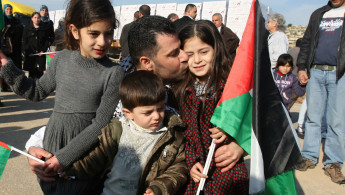Profile: Abdallah Abu Rahma, Palestinian activist
Abdallah Abu Rahma, who received a suspended sentence and a fine on Monday for peacefully demonstrating against Israel's separation wall, is a leading symbol of Palestinian peaceful resistance, and has been considered a prisoner of conscience by Amnesty International and other human rights organisations.
This was his fourth sentencing by an Israeli military court, and although it is lenient compared with previous verdicts, the main issue remains its injustice and questionable legality.
Gaby Laskey, Abu Rahma's lawyer, said at the time of his arrest that there was "no legal basis" for either arrest or conviction.
Abu Rahma, a school teacher, is a coordinator of the Bilin Popular Committee, which opposes Israel's construction of the wall in the West Bank, deemed "contrary to international law" by the International Court of Justice.
The village of Bilin has become internationally known for its weekly non-violent protests against Israel's separation wall, which have taken place since 2005. International organisations and solidarity groups, such as the International Solidarity Movement, have participated in these protests.
The Bilin protests were made famous in 2012 and 2013 by the film 5 Broken Cameras, which documented the protests from residents' point of view. It won an award at the Sundance Film Festival and was nominated for an Oscar.
Each and every week, the Bilin demonstrators march from the village to the route of the wall in an attempt to prevent further construction of the barrier which separates villagers from their olive farmland.
Each and every week, the Israeli military intervenes to stop them, which has led to injuries on both sides - and the deaths of some protesters.
When, in 2009, Abu Rahma exhibited pieces of ammunition that had been used against protestors, he was arrested by the Israeli military and charged with possession of Israeli weapons, incitement and throwing stones at Israeli soldiers.
"Comparing Abu Rahma's actual actions with the charges levelled against him is an example of the absurdity and eagerness of Israel's military court to use legal procedures as a tool to silence and smear unarmed dissent,” Laskey, the lawyer, said at the time.
In October 2010, an Israeli military court found Abu Rahma guilty of "incitement" and "organising illegal demonstrations", but was cleared of charges connecting him with violence.
Amnesty International said that the evidence on which he was convicted was "questionable". Allegations had been brought against him on the basis of evidence given by three children - who said he had encouraged people to throw stones. These statements were later retracted because they were made under duress. However, Abu Rahma still served 15 months in prison.
Monday's verdict followed his arrest in May 2012 for standing in front of a bulldozer which was reportedly clearing land for the construction of a watchtower. Abu Rahme said Israeli soldiers wanted the structure so they could shoot at Palestinians.
Rights organisations have said that the approach of Israel's military courts to cases such as Abu Rahma's violates fundamental rights and freedoms of peaceful protest which are recognised in international agreements such as the Pact on Civil and Political Rights, the Universal Declaration of Human Rights and the UN Declaration on Human Rights Defenders.
Israel is also said to be targetting popular Palestinian committees, which use non-violent means of protest such as strikes, demonstrations, legal campaigns and the support of boycotts.





 Follow the Middle East's top stories in English at The New Arab on Google News
Follow the Middle East's top stories in English at The New Arab on Google News


